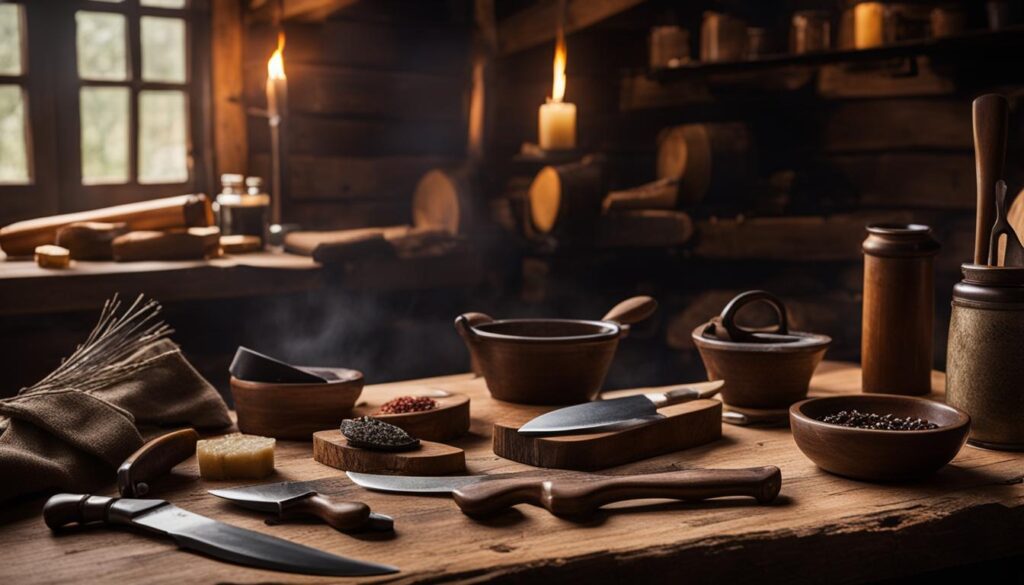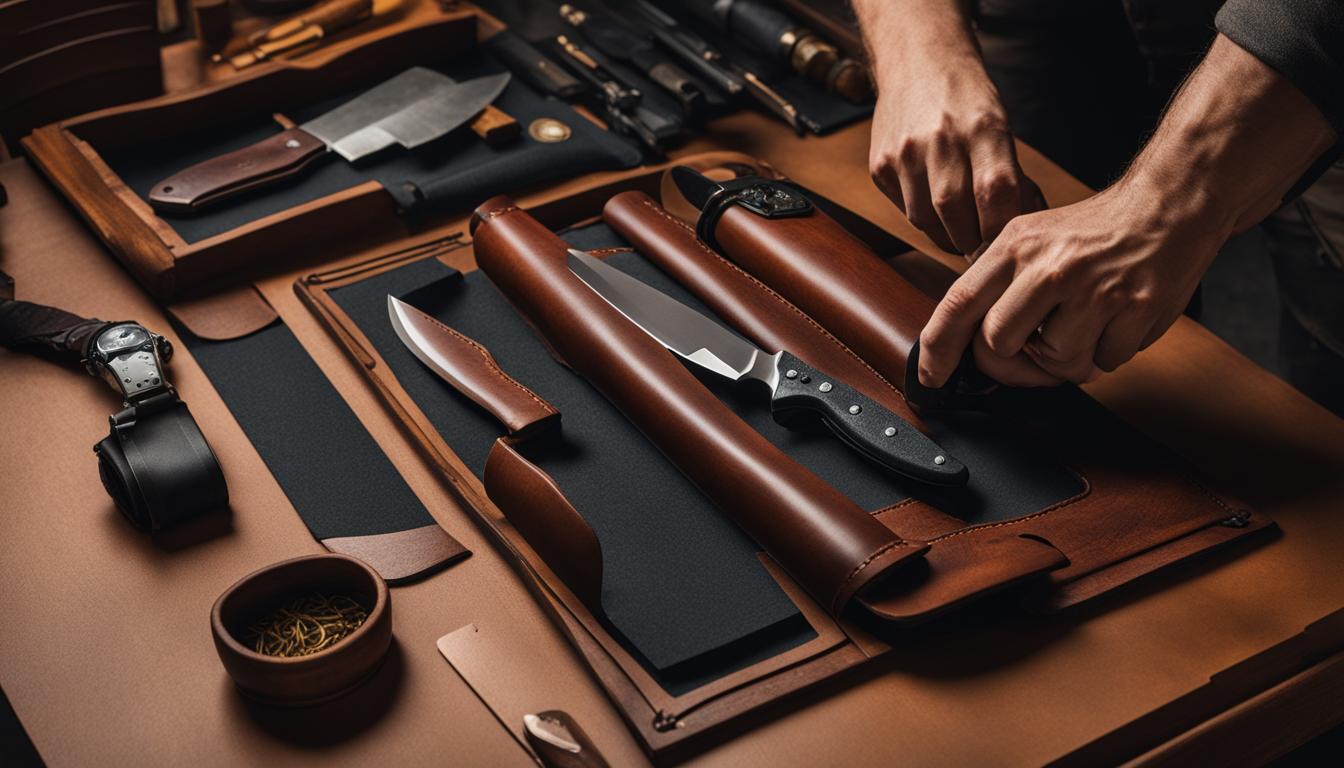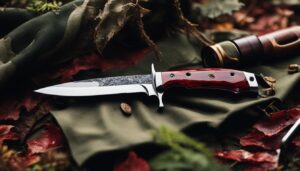Knives have been an integral part of human history for thousands of years. From their humble beginnings as simple tools for survival and utility to their modern-day status as multi-purpose implements, knives have evolved to become essential companions in our daily lives. In this guide, I will explore the optimal requirements for storing knives, specifically catering to hunting enthusiasts. By following these guidelines, you can prolong the life of your favorite hunting tool and ensure its performance when you need it most.
Key Takeaways:
- Proper knife storage is crucial for maintaining longevity and performance.
- Choose the right storage option based on personal preference and knife requirements.
- Regular cleaning and maintenance are essential to prevent rust and corrosion.
- Ensure knife storage safety by keeping knives out of reach of children and pets.
- Follow the recommended knife storage guidelines to enjoy years of reliable use.
The Importance of Proper Knife Storage
Proper knife storage is vital for prolonging the life of your hunting knives and ensuring their optimal performance. By implementing the right storage techniques, you can prevent damage, rust, and accidents, saving you the hassle and cost of replacing your valuable blades. It’s essential to prioritize knife care and follow the recommended guidelines to maximize the lifespan of your hunting tools.
When knives are stored improperly, they are susceptible to various issues. Exposure to moisture can lead to rust, compromising the blade’s sharpness and overall functionality. Storing knives in cluttered and disorganized spaces increases the risk of accidentally dropping or damaging the blades. Additionally, inadequate protection can result in injuries when handling the knives. To avoid these problems, it is crucial to invest in proper knife storage solutions.
By adopting the recommended knife storage guidelines, you can maintain the longevity of your hunting knives. Whether you choose knife blocks, magnetic knife strips, knife rolls, sheaths, or dedicated knife storage cases, each option offers its benefits and considerations. Select the storage method that aligns with your preferences, available space, and the specific requirements of your knives. Remember to keep your blades clean, dry, and lubricated to prevent rust and corrosion.
Key Benefits of Proper Knife Storage:
- Prevents rust and corrosion, preserving blade sharpness
- Reduces the risk of accidents and injuries
- Keeps knives readily accessible and organized
- Prolongs the lifespan of hunting knives
- Saves money on unnecessary knife replacements
Proper knife storage is not just about convenience, it is an essential component of responsible knife ownership. By investing in the right storage solutions and following the recommended guidelines, you can ensure that your hunting knives remain in optimal condition for years to come.
Next: Knife Storage Options and Techniques
Knife Storage Options and Techniques
Properly storing your hunting knives is essential for their longevity and performance. There are various knife storage options and techniques available to cater to different preferences and requirements. By choosing the right method, you can ensure that your knives are safely stored and easily accessible when you need them. Let’s explore some of the best ways to store knives:
1. Knife Blocks
A knife block is a popular and convenient storage option for many hunting enthusiasts. These blocks feature slots or compartments to securely hold multiple knives in an upright position. Knife blocks not only keep your knives organized but also protect the blades from unnecessary wear and damage. They are available in various sizes and designs, allowing you to select the one that best fits your collection.
2. Magnetic Knife Strips
If you prefer a space-saving and visually appealing storage solution, magnetic knife strips are worth considering. These strips utilize strong magnets to hold your knives securely against a wall or cabinet, creating a sleek and accessible display. Magnetic strips allow you to showcase your knives while keeping them within reach. However, it’s essential to ensure that the magnets are powerful enough to hold the weight of your knives.
3. Knife Rolls
For hunters who frequently travel or need to transport their knives, a knife roll is an excellent storage option. These compact and portable cases feature pockets or slots to hold individual knives securely. Knife rolls often come with additional compartments for storing sharpening tools and other accessories. With their durable construction and convenient carry handles, knife rolls provide a safe and organized solution for on-the-go hunters.
4. Sheaths
Knife sheaths are a classic and straightforward way to store and protect your hunting knives. Sheaths are typically made of durable materials such as leather or nylon and feature a secure closure system. They effectively shield the blade from moisture and physical damage while allowing for easy access when needed. Sheaths are especially useful for individual knives that require specific protection or portability.
5. Dedicated Knife Storage Cases
If you have a large knife collection or want to invest in a comprehensive storage solution, dedicated knife storage cases are an ideal choice. These cases are designed specifically for storing and organizing knives and often feature customizable compartments or foam inserts to securely hold each knife. Dedicated storage cases are available in various sizes and styles, allowing you to tailor your storage setup to your collection’s needs.
Remember, when choosing a knife storage method, consider factors such as the number of knives you own, available storage space, and the level of protection and accessibility you require. By utilizing the right knife storage option and technique, you can ensure that your hunting knives remain in top condition for years to come.
Tips for Proper Knife Storage Maintenance
Proper maintenance is crucial for ensuring the effectiveness of knife storage and extending the lifespan of your hunting knives. By following these essential tips, you can keep your knives in optimal condition, prevent rust and corrosion, and ensure their long-term performance.
Cleaning Techniques
Regular cleaning is a fundamental aspect of knife maintenance. After each use, carefully rinse your knives with warm water and mild dish soap. Use a soft sponge or cloth to remove any residue or dirt. Avoid abrasive cleaners or scrub brushes that can scratch the blade’s surface. Remember to dry your knives thoroughly with a clean towel to prevent moisture from leading to rust formation.
Rust Prevention
Preventing rust is a critical aspect of knife storage maintenance. After cleaning and drying your knives, apply a thin coat of food-grade mineral oil or a rust-preventive lubricant to the blade. This protective layer helps create a barrier against moisture and oxygen, reducing the risk of rust formation. Additionally, storing your knives in a cool, dry place, away from humid environments, further minimizes the chances of rust development.
Importance of Dryness and Lubrication
Keeping your knives dry is vital for preventing rust and maintaining optimal performance. Moisture can lead to corrosion and damage the blade’s integrity. After cleaning, ensure that all the moisture is completely removed from the knife, including the handle and any moving parts. Additionally, regular lubrication of folding knives with a small amount of oil on the pivot point and other moving parts helps maintain smooth operation and prevents rust and wear.
Table: Essential Knife Maintenance Tips
| Tip | Description |
|---|---|
| Regular Cleaning | After each use, clean your knives with warm water and mild soap to remove dirt and residue. |
| Drying | Thoroughly dry your knives to prevent moisture buildup and the formation of rust. |
| Rust Prevention | Apply a thin coat of rust-preventive lubricant or food-grade mineral oil to protect against rust. |
| Storage Environment | Store your knives in a cool, dry place to minimize the risk of rust and corrosion. |
| Lubrication | Regularly lubricate folding knives to maintain smooth operation and prevent rust. |
By following these maintenance tips and integrating them into your knife storage routine, you can ensure that your hunting knives are always ready for action. Proper cleaning, rust prevention, and regular lubrication will help protect your investment and ensure that your knives perform flawlessly for years to come.

Knife Storage Safety Measures
When it comes to knife storage, safety should always be a top priority for hunting enthusiasts. Not only does proper storage protect the blades of your knives, but it also reduces the risk of accidental injuries. Here are some essential safety measures to consider:
1. Keep Knives out of Reach
Ensure that your knives are stored in a secure location, away from the reach of children and pets. This can be achieved by using lockable cabinets or drawers specifically designed for knife storage. By keeping your knives in a place where they cannot be accessed by unauthorized individuals, you can minimize the risk of accidents.
2. Use Blade Covers or Sheaths
When storing your knives, it is essential to use blade covers or sheaths. These protective covers not only prevent accidental cuts but also help to maintain the sharpness of the blades. Ensure that each knife is properly covered before placing it in storage to avoid any potential injuries when handling them in the future.
3. Store Knives in a Safe Location
Select a storage location that is secure and away from potential hazards. Avoid storing knives near heat sources, chemicals, or other objects that could potentially damage or compromise the integrity of the blades. By storing your knives in a safe and controlled environment, you can prolong their lifespan and ensure their optimal performance.
By following these knife storage safety measures, you can protect yourself, others, and your valuable hunting tools. Remember, safety should always be a priority in every aspect of knife handling and storage.
| Safety Measure | Description |
|---|---|
| Keep Knives out of Reach | Store knives in a secure location, away from children and pets. |
| Use Blade Covers or Sheaths | Protect knives and prevent accidental cuts by using covers or sheaths. |
| Store Knives in a Safe Location | Ensure knives are stored away from potential hazards and damaging elements. |
Conclusion
In conclusion, proper knife storage is vital for hunting enthusiasts who want to maintain the performance and longevity of their knives. By following the recommended knife storage guidelines outlined in this guide, you can ensure that your knives are always in optimal condition.
Remember to choose the right storage option that suits your personal preference and the requirements of your knives. Keeping your blades clean, dry, and lubricated is crucial for preventing rust and corrosion. Additionally, prioritizing safety when handling and storing knives is essential to reduce the risk of accidents.
By implementing these knife storage techniques and maintenance practices, you can enjoy years of reliable use from your favorite hunting tools. So, make sure to invest time and effort into proper knife storage to protect your blades and enhance your hunting experience.
FAQ
Why is proper knife storage important?
Proper knife storage is important for maintaining the longevity and performance of hunting knives. It helps prevent damage, rust, and accidents, ensuring knives are always ready for use.
What are some options for knife storage?
There are various options for knife storage, including knife blocks, magnetic knife strips, knife rolls, sheaths, and dedicated knife storage cases. The choice depends on personal preference, available space, and the specific requirements of the knives being stored.
How should I maintain my hunting knives for proper storage?
Regular cleaning, drying, and lubrication of blades are crucial for preventing rust and corrosion. It is important to keep the knives clean, dry, and lubricated to maintain their effectiveness.
What safety measures should I consider for knife storage?
When storing knives, it is important to keep them out of reach of children and pets, use blade covers or sheaths, and store them in secure locations away from potential hazards to ensure safety.
How can I prolong the lifespan of my hunting knives?
By following the recommended knife storage guidelines, including choosing the right storage option, maintaining cleanliness and dryness, and prioritizing safety, hunting enthusiasts can prolong the lifespan of their knives and ensure optimal performance.





